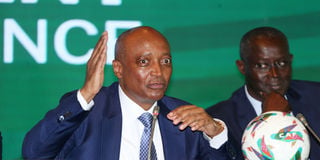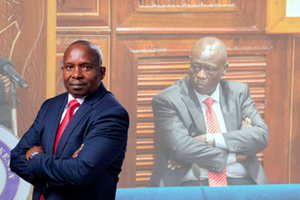CAF launches investigation over cancelled Nigeria-Libya match

Caf President Dr Patrice Motsepe addresses a press conference in Nairobi on September 16, 2024.
What you need to know:
- As the investigation unfolds, CAF aims to maintain the integrity of African football, stressing that such incidents could damage the spirit of cooperation that sports are meant to promote.
- Prominent figures in the African sports community have called for unity and peaceful resolution, urging African nations to avoid actions that may harm the continent's growing sporting reputation.
The Confederation of African Football (CAF) has taken action following the cancellation of the Group D second-leg fixture of the 2025 African Cup of Nations (Afcon) qualifier between Nigeria's Super Eagles and Libya's Mediterranean Knights.
A disciplinary committee, chaired by Senegal’s Ousmane Kane, has been constituted to investigate the circumstances leading to Nigeria's withdrawal from the match, which was scheduled for October 15 in Libya.
The committee includes representatives from various African countries, such as Jane Njeri Onyango (Kenya), who is the vice president, Mohamed Mostafa Ei-Mashta (Egypt), South African Norman Arendsa, Djonfoune Golbassia Felix of Chad, Patrick Shala of Lesotho; Douma Ibrahim Issaka of Niger; Ruth Kisaakye of Uganda; and Andrucil Taylor of Sierra Leone.
The controversy erupted after Nigeria cited poor reception and safety concerns upon their arrival at Libya’s Al Abaq airport, where they were stranded for nearly 16 hours.
The Super Eagles were left without food and water, prompting their return to Nigeria. Nigerian officials also complained that there was no representative from the Libyan government or the Libyan Football Federation (LFF) to assist them, leading them to feel endangered.
CAF expressed concern over the "disturbing and unacceptable experiences" faced by the Nigerian delegation and promised to hold any guilty party accountable.
The Libyan Football Federation (LFF), however, has threatened legal action, accusing the Nigerian Football Federation (NFF) of failing to cooperate and causing the match's cancellation. The LFF insisted that the treatment their team received during the first leg in Nigeria was worse, yet they still played the game.
Photos of Super Eagles players sleeping on benches in the airport went viral, sparking outrage. Captain William Troost-Ekong described the situation as “disgraceful” and accused Libyan authorities of deliberately revoking their landing permit as a form of psychological manipulation.
In response, the NFF has rejected the allegations, blaming logistical issues on the LFF. The Nigerian delegation claimed that the LFF did not communicate essential details about their arrival and made last-minute changes, such as landing in Port Harcourt instead of Uyo.
Despite the disruption, the NFF managed to accommodate the Libyan team, and they dismissed the LFF’s complaints as unfounded.
As the investigation unfolds, CAF aims to maintain the integrity of African football, stressing that such incidents could damage the spirit of cooperation that sports are meant to promote.
Prominent figures in the African sports community have called for unity and peaceful resolution, urging African nations to avoid actions that may harm the continent's growing sporting reputation.




